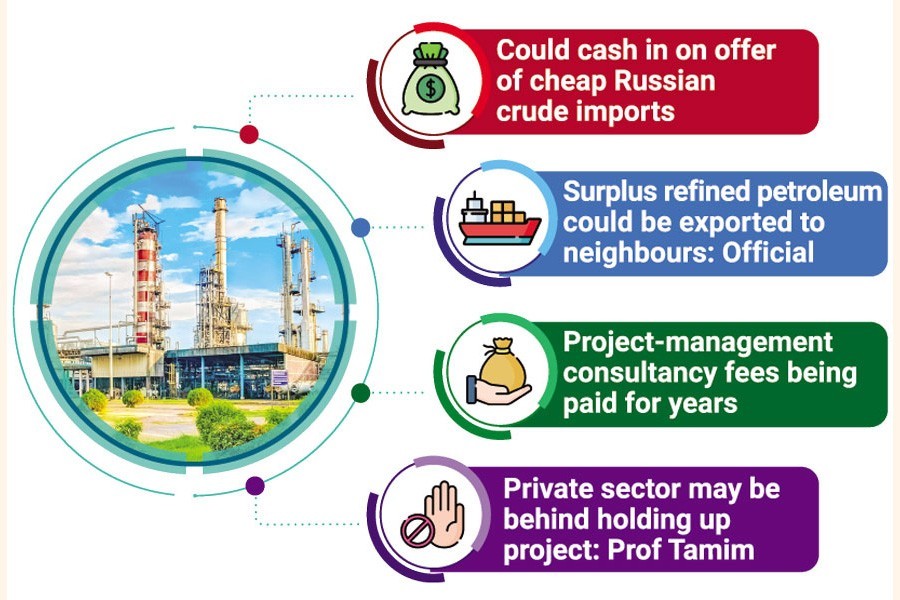Millions of dollars missed on stalled refinery project
Bangladesh could save $250m per annum, export huge petroleum

Published :
Updated :

Bangladesh misses out an opportunity to save annually around US$250 million through lower imports and also to export huge refined petroleum as a much-needed refinery has long been "stalled".
Had the 3.0-million-tonne-capacity crude-oil refinery been built in time, state expenditure on diesel and other petroleum products could be significantly cut down, says a senior official of the state-run Bangladesh Petroleum Corporation (BPC).
It could go a long way in keeping the country's foreign-currency reserves 'strong' during the current crisis bred in global energy market volatility, he says, when the country passes through fuel and foreign-exchange crunch in lockstep with many other countries following global supply-line disruptions by pandemic and war.
The country could also earn valuable foreign currency through exporting 'extra' refined petroleum products to neighbouring countries, including Sri Lanka, Myanmar, and landlocked Nepal and Bhutan, the official adds.
Bangladesh could also cash in on the offer of cheap Russian crude import had the refinery been built, say sources.
"We lost the opportunity of having the cheap Russian 'heavy crude' oil as our old refinery -- Eastern Refinery Ltd (ERL) -- does not have the capacity to refine heavy crude oil," says the BPC official.
The ERL only has the capacity to refine light crude as it is so old.
State Minister for Power, Energy and Mineral Resources Nasrul Hamid unveiled the information of receiving Russian offer of crude oil during last May when the price of Brent crude, the benchmark in determining oil prices, was hovering high around US$113 per barrel.
On the contrary, the government has been counting additional expenditure for paying fees to an Indian project-management consultant appointed for building the crude refinery - Engineers India Limited (EIL), say sources.
The government extended the contract tenure of the IEL by four more years, totalling seven years, last year due to the delay in rolling the refinery project into reality, they add.
Consultancy cost has also more than doubled to around Tk 2.56 billion as a consequence, they lament.
Energy experts and rights groups see 'conspiracy' of private sector, especially those who import furnace oil of their own to run their power plants.
Officials said had the planned crude-oil refinery been built in time, Bangladesh could have the total crude-refining capacity of around 4.50 million tonnes per annum instead of the current capacity of around 1.50 million tonnes of the lone one, ERL.
Crude price on the international market is relatively cheap, and sometimes the price of refined oil more than doubles that of the crude oil, market-insiders say.
Bangladesh's annual oil demand is around 9.5 million tonnes, including around 1.50 million tonnes of crude oil.
Apart from the total BPC import of around 6.5 million tonnes of refined and crude oil combined, the private sector imports around 3.0 million tonnes of furnace oil.
A new crude refinery could reduce the import of refined oil both by the BPC and the private sector, they add.
It could help the government pay less to privately owned furnace oil- fired power-plant sponsors.
The government has been providing 9.0 per cent on top of their furnace oil-import costs as 'incentives' for over the 12 years since 2010.
The move for building a new refinery, trebling the country's crude- refining capacity, was initiated in 2015 when a memorandum of understanding was signed between the BPC and French firm Technip.
Technip carried out the front-end engineering and design (FEED) for the refinery at a cost of Tk 2.57 billion (US$ 32.10 million).
To expedite the project works the BPC on April 19, 2016 assigned the Indian consultancy to manage the project.
The BPC on January 18, 2017 assigned Technip to carry out the FEED work for the proposed refinery.
But, to date, the government could not select the mode of selecting the contractor to build the much-needed refinery.
Talks in government high-ups are still on as to whether the contractor should be selected through launching a competitive bidding or through unsolicited deal bypassing tender, the sources say.
"Private sector may be playing a key role in holding up the project for their own gain," energy expert Prof M Tamim told the FE.
He notes that the government could import less quantity of expensive diesel and export petrol to neighbouring countries if the new refinery could be built.
It could save huge foreign currency and the government could avoid paying extra money to private sector, says Mr Tamim, who was special assistant to the chief adviser of the previous caretaker government.
Energy adviser of the Consumers Association of Bangladesh (CAB) Dr M Shamsul Alam echoed the views, terming it "national vandalism".
"This is unfortunate that the national interest is being surrendered to vested quarters on ill motives," he says.
Currently, Bangladesh is implementing austerity measures shutting all diesel-fired power plants and embracing load-shedding amid planet-wide hot spell.
Commercial banks are also asked to ensure austerity by reducing consumption of diesel along with natural gas and lubricants by 20 per cent within next one year.
Sources said a consortium of three French companies led by Technip had installed the first unit of the ERL, the country's sole refinery. The first unit started commercial operation way back in 1968 with an economic life of 30 years.
The first unit is, however, still in operation having a de-rated capacity of around 1.5 million tonnes.
Azizjst@yahoo.com


 For all latest news, follow The Financial Express Google News channel.
For all latest news, follow The Financial Express Google News channel.